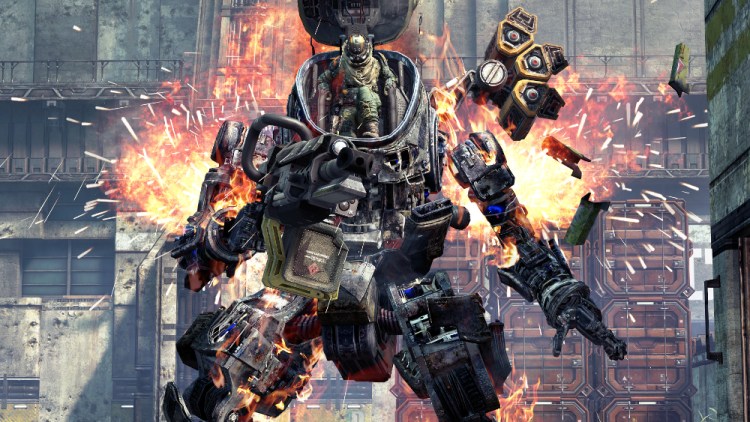Mike Minotti, staff writer and community manager
Game of the Half Year: Bravely Default (3DS)
Last year, I picked Fire Emblem Awakening, a role-playing game for the 3DS, as my favorite game. So far, another 3DS RPG is taking my top spot for 2014.
Bravely Default is a fantastic callback to the sort of epic adventures I loved playing on the Super Nintendo, like Final Fantasy VI and Chrono Trigger. It also introduces some innovative battle mechanics that add layers of depth to the traditional turn-based battle system.
Oh, and the soundtrack is fantastic. A few of the tracks have earned a permanent place in my video game music playlist.
Gavin Greene, staff writer
Game of the Half Year: Dark Souls II (Xbox 360, PlayStation 3, PC)
I had avoided the Souls franchise in all of its incarnations out of fear of being proven weak when it came to my gamer skills. But fate brought a copy of Dark Souls II my way just when I was feeling masochistic enough to give it a try. My misconceptions about myself and the action-RPG were delightfully disproved. It was the biggest surprise of the year until E3 told me I was going to be playing Grim Fandango on my Vita soon.
Dark Souls II is a game that doesn’t hate the player, it just trusts their intelligence. Each death comes with the awareness of the specific failures you can and will overcome. The game manages to draw you into a sort of trance, fully entrenching you in the world without needing to hit you over the head with exposition every ten minutes. Sixty hours flew by in a way I haven’t seen since my time with Final Fantasy VII or IX.
Dark Souls II is at both a tough but forgiving old school adventure and a wholly unique way to leave the rest of the world to its own devices for a few hours. Nothing else this year has come close.
Chris Hoadley, moderator
Game of the Half Year: Lightning Returns: Final Fantasy XIII (Xbox 360 and PlayStation 3)
I didn’t play a lot of new games in the first half of this year, and this was a title I liked more for its intent than its execution. This conclusion to the Final Fantasy XIII saga is an open-world title in a realm approaching Armageddon that was vague at times and makes the player a servant to a draconian clock mechanic (and a strategy guide). I also get the feeling that the biblical-themed story would be better as a stand-alone tale rather than contorting it into FF13’s already complex universe.
But hear me out.
I did like that Lightning was more than a monster-killer for hire — she has to save the world by actually helping people as completing subquests was necessary to earn stat boosts and each mission attempts to focus on different ways that people handle death and find closure to their lives. Lighting Returns also reimaginges its battle system as a highly customizable affair based on meter management, timing attacks, and selecting the best classes to exploit enemy weaknesses. Plus, the game isn’t afraid to put the pink-haired heroine in challenging situations that force you to keep an eye on your lifebar. Lightning Returns is a game of ideas that’s messy and confounding but also interesting in its own way.
Brandin Tyrre, writer
Game of the Half Year: Smite (PC)
Just over a year and a half ago, I watched a video of the Greek God of the Sea, Poseidon, releasing the Kraken on Ra, the Egyptian Sun God, utterly engulfing him in an explosion of water and scales and teeth. I’ve played Smite nearly every day since.
As a guy that made several earnest attempts to enjoy the click, click, clicking of the genre’s traditional archetypes, limping away from each experience unsatisfied and confused as to why they just didn’t grab me, Smite’s control scheme (W,A,S,D) and skill shots (you have to aim every ability, melee and ranged attack) answered those questions. On paper, all games of this sort share the same necessity for strategy, cooperation, and tactics. But Smite, to me, has that hook factor that just keeps me coming back day after day. The excellently visualized and themed Gods from various pantheons speak to the kid in me who grew up devouring mythology; the third-person view, personal controls, and skill-based attacks play on my competitive desires; and the innumerable moments in every match that contribute to the final outcome beckon to the strategist in me. Smite is a MOBA for people who don’t know they actually like MOBAs.
Granted, Smite enjoyed a lengthy open beta, but the third-person, action-based MOBA only just officially released this year. And while some might look at that as cheating, Smite is a radically different game today than it was when I first caught sight of it in 2013, and it’s evolving every day.
VentureBeat's mission is to be a digital town square for technical decision-makers to gain knowledge about transformative enterprise technology and transact. Learn More



